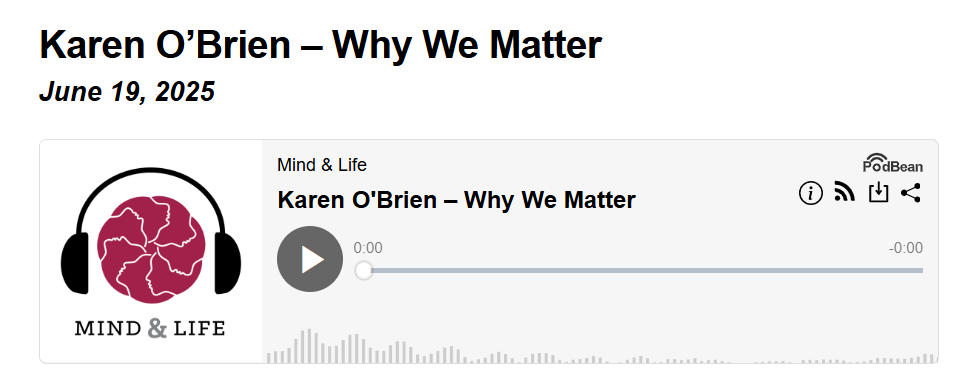Speaking Up
In times of crisis, our voices matter. Regardless of our speech habits or idiolect, we can all inspire action when we speak with integrity for a just and sustainable world.
Let’s Talk
Speak up! I’ve been hearing this a lot lately. In fact, the calls to speak up and speak out are growing louder as we heat the Earth, witness genocide unfolding in front of our eyes, and watch despots destroying democracy.
How do those of us who still have the freedom to speak make use of our voices in powerful and responsible ways? How do we avoid succumbing to the fears that are spiraling the world into a true nightmare?
“Speak up” sounds simple, but the truth is that using our voices can make us feel vulnerable. It can, in some cases, be dangerous.
In a polarized, fragmenting world with a virally sick media landscape that is full of trolls, speaking up on behalf of all people and species can be risky. It’s intimidating.
When we speak out for equity, justice, democracy, nature, and sustainability, some people will feel provoked and react. “Don’t expect people to clap for you when you rattle the system,” says Dr. Monica Sharma, author of Radical Transformational Leadership: Strategic Action for Change Agents.
Monica also points out that we have true power when our voices are grounded in universal values — in what we care deeply about for ourselves and all others. This connects us with an entangled space of oneness. When we are in touch with our essence, we become what she calls “unmessablewith.” This is a power that despots and dictators will never have.
The Cringe
Still, sometimes we are our own worst critics. We judge and silence ourselves, convinced we have nothing to say that is worth listening to.
I’m guilty of this. I give a lot of talks and participate in plenty of panels, debates, and podcasts. Some would say (with a big yawn!) that I’m always talking about climate change, sustainability transformations, fractal agency, and quantum social change.
I love to talk, but I hate listening to myself. It’s painful. So I avoid sharing videos and recordings of podcasts or talks. Why? Well… um, you know, like, ahh… it’s those filler words and things.
Listening to myself makes me cringe.
Owning It
I’m not alone! I’ve met many who feel the same, including actors, teachers, journalists, and others whose jobs involve their voices. When we hold an idealized image of how we should sound, hearing ourselves can be difficult. It’s easy to feel inarticulate in a teleprompted world.
But we no longer have time to cringe. We have to use our voices to call out injustice and cruelty—and inspire ideas, strategies and actions consistent with an equitable and thriving world.
In her book Permission to Speak, podcaster and voice coach Samara Bay helps us to own our voice, regardless of its flaws: “The imperfection is the action; it’s what makes communication surprising and alive and a collective effort.”
Samara Bay introduced me to the word idiolect, which relates to idioms, not idiots. It describes a person’s particular speech habits:
It’s the way you sound different from every other human on Earth because your voice reflects your unique life experience.
What an empowering thought! My “ums” are one of a kind. They’re part of my idiolect. Samara Bay puts it more poetically:
No one else on the planet sounds exactly like you. You are the human experiment right where you are, and your voice is its hypothesis and its conclusion.
Our job, she says, is to put words together and to create meaning where there was none before. Her advice made me smile: “Trust that the in-between words don’t matter. Let that shit go. What comes out will be right enough.”
Letting Go
In times of crisis, we have to let that shit go. There is too much at stake for us not to speak out on behalf of justice and planetary integrity. Right enough is good enough.
Future generations will probably not count how many times we said “you know” or “and things.” They will more likely be grateful that we opened our mouths, spoke up, and used our voices and actions to regenerate rather than degenerate the world.
Here are three recent podcasts I took part in. It was fun to talk with Wendy, Carola, and Veslemøy—three women who are creating powerful platforms that enable people to speak up. And yes, in an effort to embrace my idiolect, I did listen to the recordings.
Mind & Life podcast by Wendy Hasenkamp, Exploring the Frontiers of Contemplative Science, June 19, 2025.
Veslemøy Klavenes-Berge’s podcast: Stories for the Future, June 26, 2025.
Carola Verschoor’s podcast: Transforming Worlds July 20, 2025 (with Idun Aune too).
Postscript: I’m in Johannesburg this week for the Transformations Community/Earth System Governance 2025 conference, a gathering full of conversations, dialogues, and creative input on “Navigating Sustainability Transformations Towards Justice and Equity.” I’ll be back with inspiration for future newsletters!
Silence becomes cowardice when occasion demands speaking out the whole truth and acting accordingly.” — Mahatma Gandhi





